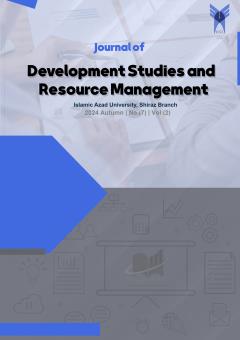Designing the Career path resilience model in banking industry staff (Case study: Tejarat Bank of Gilan Province)
Subject Areas : Public Administrationmusa rezvani 1 , Nadia Amini 2 , morteza hazrati 3
1 - assistant prof
2 - دانشجوی دکتری مدیریت دولتی- منابع انسانی، دانشکده مدیریت، دانشگاه آزاداسلامی، آستارا، ایران
3 - assistant prof
Keywords: Resilience, Career path, Tejarat Bank,
Abstract :
The development of the career path and hierarchical promotion requires strengthening the capacity of adaptability and suitability to challenges. The resilience of the career path expresses the interaction of individual characteristics and the environment and brings the ability to adapt to the changing environment and deal with adverse conditions in the work environment. Therefore, the current research was conducted with the aim of designing a model of career path resilience in banking industry employees. This qualitative research was compiled using thematic analysis; In this research, using semi-structured interviews with 21 experts in the field of human resource management and public administration, the findings were combined and the present model was designed. Based on this, by analyzing the content of the interviews and researches using MaxQda2020 software, the relevant dimensions and codes were extracted and the importance and priority of each was determined using Shannon's entropy technique. Based on the research approach, 3 categories, 37 concepts and 121 codes were extracted. Role ambiguities, strategic agility and prevention of functional weakening in the causal factors section, environmental awareness, strategic vision and career evaluation in the strategies and promotability, psychological health and problem-solving capacity improvement in the consequences section obtained the highest coefficient of importance. In this research, the career path resilience model was presented in the form of three parts: causal factors, strategies and consequences. Since a comprehensive model for career path resilience has not been presented so far, this research can be beneficial in line with emerging challenges, career path development and productivity improvement in the banking industry.
Abele, A. E., Hagmaier, T., Spurk, D. (2016). Does career success make you happy? The mediating role of multiple subjective success evaluations. Journal of Happiness Studies, 17, 1615–1633.
Ahmad, B., Latif, S., Bilal, A. R., & Hai, M. (2019). The mediating role of career resilience on the relationship between career competency and career success: an empirical investigation. Asia-Pacific Journal of Business Administration.
Callanan, G. A., Perri, D. F., Tomkowicz, S. M. (2017). Career management in uncertain times: Challenges and opportunities. Career Development Quarterly, 65, 353–365.
Cameron & G. M. Spreitzer (Eds.), The Oxford handbook of positive scholarship (pp. 895–908). Oxford, England:
Caza, B. B., & Milton, L. P. (2012). Resilience at work: Building capability in the face of adversity. In K. S.
Chiaburu, D. S., Baker, V. L., Pitariu, A. H. (2006). Beyond being proactive: What (else) matters for career self-management behaviors? Career Development International, 11, 619–632.
Han, Y. (Jade), Chaudhury, T., & Sears, G. J. (2021). Does Career Resilience Promote Subjective Well-Being? Mediating Effects of Career Success and Work Stress. Journal of Career Development, 48(4), 338–353. https://doi.org/10.1177/0894845319851875
Heslin, P. A. (2005). Conceptualizing and evaluating career success. Journal of Organizational Behavior, 26, 113–136.
Hartmann, S., Weiss, M., Newman, A., & Hoegl, M. (2020). Resilience in the workplace: A multilevel review and synthesis. Applied Psychology, 69(3), 913-959.
King, D. D., Newman, A., Luthans, F. (2016). Not if, but when we need resilience in the workplace. Journal of Organizational Behavior, 37, 782–786.
Lee, C., Huang, G. H., Ashford, S. J. (2018). Job insecurity and the changing workplace: Recent developments and the future trends in job insecurity research. Annual Review of Organizational Psychology and Organizational Behavior, 5, 335–359.
London, M. (1983). Toward a theory of career motivation. Academy of Management Review, 8, 620–630.
London, M., Noe, R. A. (1997). London’s career motivation theory: An update on measurement and research. Journal of Career Assessment, 5, 61–80.
Lyons, S.T., Schweitzer, L. and Ng, E.S.W. (2015), "Resilience in the modern career", Career Development International, Vol. 20 No. 4, pp. 363-383. https://doi.org/10.1108/CDI-02-2015-0024
Mishra, P., McDonald, K. (2017). Career resilience: An integrated review of the empirical literature. Human Resource Development Review, 16, 207–234. Oxford University Press.
Rossier, J., Ginevra, M. C., Bollmann, G., & Nota, L. (2017). The importance of career adaptability, career resilience, and employability in designing a successful life. In Psychology of career adaptability, employability and resilience (pp. 65-82). Springer, Cham.
Seibert, S. E., Kraimer, M. L., & Heslin, P. A. (2016). Developing career resilience and adaptability. Organizational Dynamics, 45(3), 245–257. https://doi.org/10.1016/j.orgdyn.2016.07.009
Tokbaeva, D., & Achtenhagen, L. (2021). Career resilience of female professionals in the male‐dominated IT industry in Sweden: Toward a process perspective. Gender, Work & Organization.
Waterman, R. H., Waterman, J. A., Collard, B. A. (1994). Toward a career resilient workforce. Harvard Business Review, 72, 87–95.


